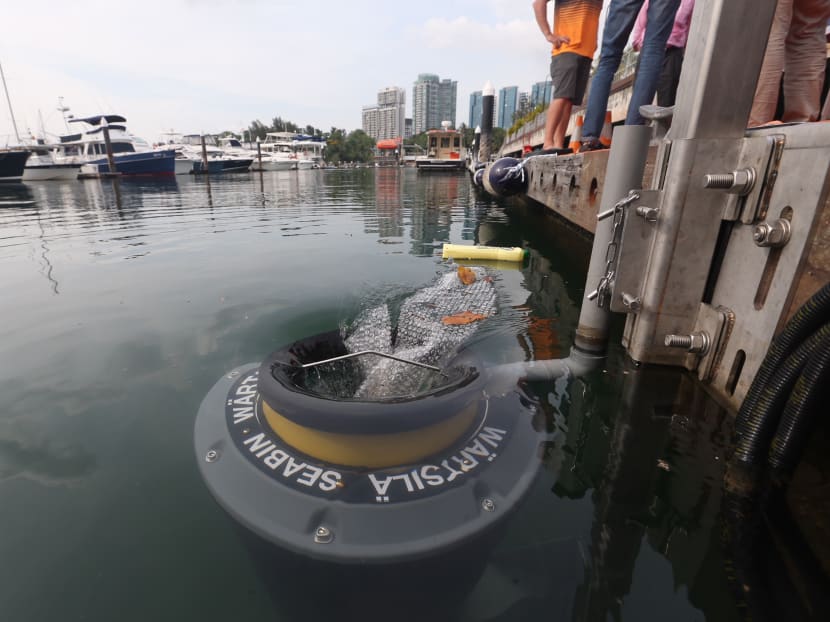Floating garbage can: First Seabin installed in S’pore waters at yacht club
SINGAPORE — There may not be a severe litter problem in the waters near the Republic of Singapore Yacht Club (RSYC) along the west coast, but a floating garbage bin ended up collecting about 2kg of trash within 24 hours.

Seabin, a floating rubbish bin which is placed in water at marinas, docks, yatch clubs and commercial ports, collects all floating rubbish debris, surface oil and pollution in the water. Photo: Koh Mui Fong/TODAY
SINGAPORE — There may not be a severe litter problem in the waters near the Republic of Singapore Yacht Club (RSYC) along the west coast, but a floating garbage bin ended up collecting about 2kg of trash within 24 hours.
Plastic bottles, aluminum drink cans and empty instant noodle cups were some of the rubbish collected on Monday (April 9) during a pilot run of the Seabin, which was officially launched on Tuesday.
It is a first in Asia, with about 30 others in six locations including England, Finland, France, Spain and the United States. About half a tonne of debris can be collected by each Seabin a year.
For the yacht club, the bin is helpful when manpower is tight. Mr Albert Fong, rear commodore of the RSYC, said that the low-maintenance device takes about two days before it is filled up and emptied at the club, and can operate unmanned. So it is “perfect for over the weekends, when there is less manpower”, he added.
Before this, staff members in charge of housekeeping — one on land and two deck hands — survey and pick up trash washed into the marina daily, Mr Fong said.
The Seabin is the brainchild of Pete Ceglinski, a 40-year-old Australian.
It is able to collect trash such as water bottles, plastic bags, styrofoam, plastic pellets and other debris.
The device is connected to an electrical, submersible water pump which moves an inner basket up and down the water’s surface, allowing the bin to pull in water and trash around it.
Water is sucked in from the surface and passes through a catch bag fitted inside the bin. Made of hessian mesh, the bag is able to trap debris and micro-plastic up to 3mm in size, while filtering the rest of the water back into the marina.
The bag can be used for up to two years before it needs to be changed, and each can collect up to 20kg of debris every hour before it has to be emptied.
If fishes or sea creatures are caught, they would remain in the water within the bin, until they are tossed back into the water when a worker cleans the filter bag.
Under calm water conditions, a Seabin can take in trash within a range of 1m to 10m, but its efficiency is heavily dependent on wind and water conditions.
While the Seabin cannot singlehandedly solve the massive problem of marine trash and plastics, Mr Ceglinski hopes to make some small impact in protecting the marine environment, saying that his project is also a way to educate people about this ecological issue.
The first Seabin was commercially installed in Portsmouth, England. As the project expands, more than 5,000 orders are expected to be fulfilled in the next two years, and the target is to collect up to 70,000 tonnes of debris.
The most commonly caught items include cigarette butts, plastic particles and food wrappers. Here in Singapore, Mr Ceglinski was surprised to find that there were “so many plastic nurdles”, which are resin pellets used to make products such as pens.
Mr Ceglinski told TODAY that he was inspired to come up with the product after becoming “disillusioned” with single-use plastic products and seeing the amount of trash in marinas where he worked.
“I was a boat builder for 11 years… Going around the world, fixing boats, I’d visit up to 12 countries a year, and I realised every single marina had the same problem.”
He quit his job and, with some savings and US$276,000 dollars raised for the Seabin project, got the product ready for the market and the business up and running.
Last year, a prototype video showing how the Seabin works went viral, shooting the product to international fame. It played a part in helping the project get into a partnership last year with Wartsila, a Finnish global technology group, which donated the Seabin to RSYC. Each bin cost €3,300 (about S$5,300).
Mr Daryl Lim, a senior account manager who oversees contract and project sales development at Wartsila Singapore, told TODAY: “Our company happens to share the waterway with the yacht club. Our office in Singapore is located in the vicinity at Pandan Loop, so we are not only helping with marine trash but also helping our immediate community.”
The company is planning to set up Seabins at two other marinas in Singapore, and is also looking to deploy the bins in other countries such as India, Malaysia and Thailand.






